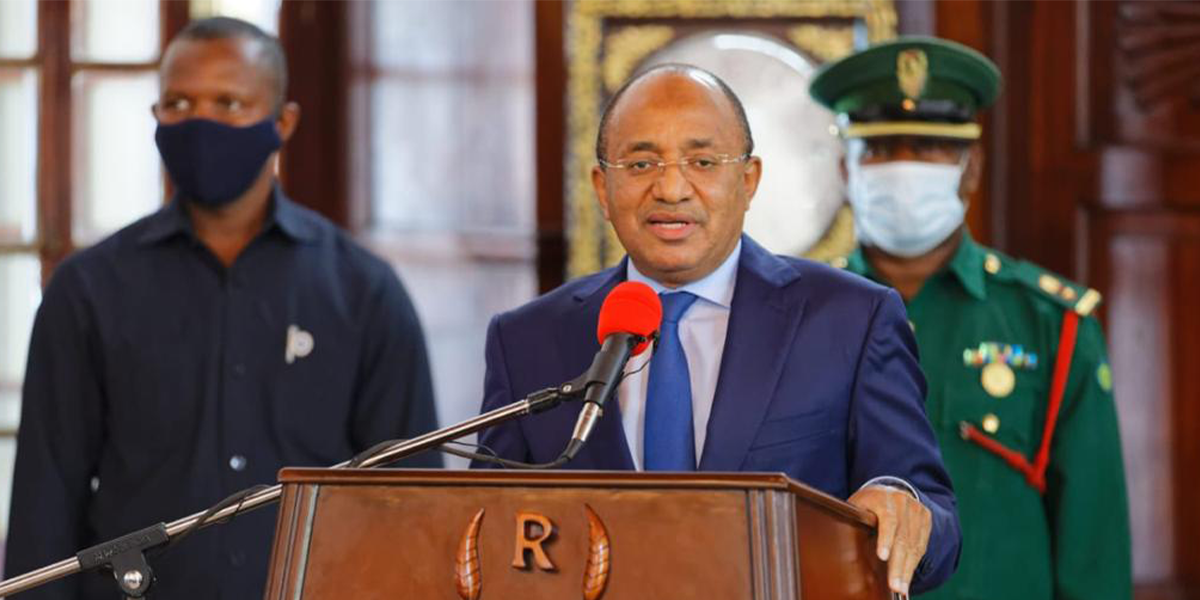News
Zanzibar's Bright Future as a Blue Economy Destination
Catalysing economic growth in the Indian Ocean archipelago will require pivoting away from the status quo with decisive political leadership. The question is, which of the two will triumph in the end?

Associate Researcher, The Brenthurst Foundation

Researcher, The Brenthurst Foundation

As holiday destinations go, Zanzibar is a favourite for many looking to escape to an island paradise. The chain of islands, which form part of Tanzania, is the birthplace of Freddie Mercury, lead vocalist in the British rock band Queen. The Indian Ocean archipelago boasts a fascinating heritage spanning Swahili, Portuguese, Arab, Indian and British influence, and picturesque white sand beaches. This unique tourist offering has proven lucrative for Zanzibar as it employs some 50,000 people directly and contributes almost $900-million to GDP each year.
But the idyllic image which has come to define Zanzibar hides a reality that is increasingly common across island economies: a fragile, tourist-centric economy that is struggling to diversify. Coupled with youth unemployment above 40% and the looming threat of a burgeoning population, Zanzibar's need to explore other avenues for sustainable economic growth is imperative.
The Covid-19 pandemic wreaked havoc on Zanzibar in 2020, cutting international tourist arrivals by 52% compared with the previous year. Tourist numbers dropped from 61,752 in February to 197 in May. The industry — and the broader economy — was on the brink of a devastating collapse save for a timely intervention by the state to secure an influx of Russian and Eastern European tourists. Resorts suffered a severe blow and had to dramatically reduce costs to appease a more thrifty clientele.
This disruption to what has been a reliable source of foreign exchange (the largest contributor) has forced Zanzibar to reflect on its economic landscape and the ways to diversify its economy — an inevitable transition that will need to prove equitable for its 1.6 million inhabitants.
While tourism is the poster child of Zanzibar's economy, it is not the largest contributor towards GDP or employment — that title belongs to agriculture and fishing. The sector accounts for $410-million and employs some 208,000 men and women throughout the archipelago.
Every day an estimated 45,000 fisherfolk navigate the ocean in search of fish, while women harvest seaweed in the shallow turquoise waters close to shore.
Seaweed and cloves are particularly important cash crops for Zanzibar's economy and provide a key value-addition avenue. In 2020, Zanzibar produced more than 3,000 tons of cloves and 8,000 tons of seaweed, bringing more than $18-million and $2.6-million, respectively, almost none of which is processed except sun-dried.
Seaweed, for instance, sells for $0.30/kg, and yet, according to industry experts, processed seaweed could fetch more than double that price.
That Zanzibar should ascend into higher value-add with its agricultural produce is imperative. A sustained effort will need to be made to redesign the existing value chain and incentivise and equip key players within the private sector to venture into value addition — a process that will benefit them as much as Zanzibar's farmers and aquaculture workers, and the economy at large. This, however, demands more than just vision statements. Examples will need to be set as much as vested interests tackled.
For Zanzibar to pivot away from the status quo and to unlock sustainable and equitable economic growth for its people, decisive leadership is required and it must start from the top.
A medical practitioner by training and the son of former United Republic of Tanzania president Ali Mwinyi, President of Zanzibar Dr Hussein Mwinyi says he is determined to drive change.
Prior to assuming office in November 2020, he served as the Tanzanian Minister of Defence and National Service and as Minister of Health and Social Welfare. Mwinyi has already shown his intent, having conducted a cabinet reshuffle while also spearheading several infrastructure upgrades. A drive from Abeid Amani Karume Airport to Stone Town reveals newly built pavements, tarred roads and a stormwater drainage system.
Unsurprisingly, discussions with government officials all conclude with the same sentiment: “He [President Mwinyi] wants to get things done”.
Public reinforcement and infrastructural upgrades are a step in the right direction for driving widespread and meaningful change. However, the true test for Mwinyi is whether he can tackle the larger systemic challenges around job creation, unemployment and reliable energy that threaten to destabilise Zanzibar.
Key to this success is the need to make tough choices around efficiently allocating resources — people, natural and financial — to catalyse growth across Zanzibar's primary economic drivers.
Starting with tourism, Zanzibar must reclaim its international flow of tourists. Some of this will depend on foreign governments and their decision to classify Tanzania as a safe destination. Much of it will also depend on Zanzibar's ability to demonstrate an open-for-business economy and the requisite protocols are observed enough to compete with other island economies.
The semi-autonomous government of Zanzibar can certainly influence this by expediting its vaccine programme, which as of July 2021 had seen only 3,000 citizens vaccinated. As with any economic sector, the imperative to act and remove obstacles to opening up tourism will define who the winners will be now and in our new normal.
This crisis also presents a unique opportunity for Zanzibar. Desiring to change tack and climb higher in the value chain of the global tourism market, Zanzibar can alter its medium- to long-term vision to focus on a low-volume, high-value model which seeks to attract a more exclusive and high-end demographic. This will give the island more bang for its buck. Here is where the government can unlock growth on the northern island of Pemba, for instance, which has lived in the shadow of Unguja, the island home to Stone Town.
Greater focus also needs to be given to addressing the absence of value addition within the fisheries and aquaculture sectors. Moving further up the value chain will require greater effort and an altogether different set of capabilities, both from the government and the labour force. For Zanzibar, this will require improved education among artisanal fishermen while also attracting inward investment to drive commercialisation of the sector (think cold storage facilities, processing and packaging factories and logistics.) A key opportunity lies in leveraging “blue bonds” to finance these endeavours and to help conserve Zanzibar's marine environments.

All this will require improved port infrastructure. The main port of Malindi serves as one of the busiest passenger terminals in East Africa, with about 1.5 million passengers each year and an estimated 100,000 TEU (a measure of a ship's cargo) capacity annually. The challenge for the port is that it is ill-capacitated and severely congested, with development constrained due to its location within a Unesco World Heritage site. Zanzibar cannot compete with the likes of Mombasa or Maputo, with annual TEU of 1,100,000 and 350,000, respectively. Potential exists to establish a new and upgraded port facility as a trans-shipment destination within a larger East African ports complex. This approach will enable the port to accommodate modern containership drafts and ease traffic across the Indian Ocean trade corridor.
The goal for Mwinyi should not be to police each of these sectors or involve the government as a critical stakeholder; his focus must be geared towards creating a proactive and streamlined government that will facilitate and champion the creation of an attractive environment for investment — and business.
This will require addressing the bloated civil service, which comprises 16 ministries and some 40,000 employees. Focus should be placed on ensuring the right kind of human capital to aid service delivery. More will need to be done around boosting productivity within the civil service, and this is where the introduction of performance metrics for all civil servants will pay dividends.
In the short to medium term, Mwinyi and his team will need to identify the critical gaps, locate home-grown talent and incentivise its return, and, where required, attract external talent needs to fill the gaps. Simultaneously focused scholarship and training schemes need to be established to fast-track the development of suitable graduates into key positions. In the longer term, there is the need to focus on developing the education system and tuning it to the needs of the nation and the rapidly changing global marketplace.
Complementing these reforms will be the adoption of digital technologies. Zanzibar has already made inroads with its roll-out of digital services for the population — it is currently piloting a digital tax platform for all citizens and has also introduced an online portal for registering and accessing Covid-19 test results. But why stop there? Due to its size, Zanzibar should be looking at deeper penetration of digital systems by expanding the bouquet of e-services to its citizenry, including fixing the many broken ministerial websites and scaling up procurement and digital payment services for all government transactions.
A unique opportunity also presents itself for Zanzibar to tap into the main Seacom cable that runs along Africa's east coast. A successful “spur” from the main cable — just 5km out from Zanzibar — will enable widespread connectivity across the archipelago at an affordable rate for its citizens. More exciting is the prospect of Zanzibar leveraging this connection and establishing itself as a data centre hub for the African continent.
Zanzibar needs a well-integrated mechanism constructed around the necessary procedures to achieve these aims and support these processes. This body will advocate for the inflow of capital and resources into priority areas. A dedicated investment board similar to those seen in Rwanda (Rwanda Development Board) and Costa Rica (Costa Rican Investment Promotion Agency) will provide a platform for Zanzibar to punch above its weight when sourcing investment. Such a body would allow information to be briefed, decisions made, and then implemented and monitored in a manner that generates the required tempo.
Not many view Zanzibar as a hotbed for economic growth. The archipelago has capitalised on its natural attractions and relaxed way of life by creating a multi-million-dollar tourism sector that attracts those looking to unwind and detach from their fast-paced lives. Yet much more can — and should — be done if Zanzibar is to unlock economic growth and better living standards for its 1.6 million inhabitants.
Mwinyi cannot do it alone, but he certainly can set the wheels in motion towards breaking free from the mould which has come to define Zanzibar, as with other island economies.
This article was originally published by Daily Maverick.

